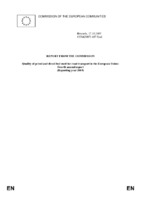| dc.description.abstract | Directive 98/70/EC1 sets minimum specifications on health and environmental grounds for fuels to be used for vehicles equipped with positive-ignition and compression-ignition engines. Fuel quality is environmentally important because it affects engine pollutant emissions and thus air quality. It also affects the ease and cost with which desired pollutant and greenhouse emission limits can be achieved by manufacturers. Directive 2003/17/EC2, amending Directive 98/70/EC, requires a further reduction of the sulphur content of petrol and diesel fuels. Non-respect of the fuel specification can lead to increased emissions (for example excess oxygenates can increase NOx emissions) and might damage engine and exhaust after-treatment systems (for example excess sulphur damaging catalysts) leading to higher air pollutant emissions. In order to ensure compliance with the fuel quality standards mandatory under this Directive, Member States are required to introduce fuel quality monitoring systems. Article 8 of Directive 98/70/EC requires the Commission to publish annually, a report on fuel quality in the Member States. This fourth Commission Report summarises Member States’ submissions on the quality of petrol and diesel, as well as the volumes sold, for the year 2005. All Member States except France submitted national reports for 2005. The monitoring of fuel quality in 2005 shows that the specifications for petrol and diesel laid down in Directive 98/70/EC are in general met and again few exceedances were identified. For petrol the main parameters where exceedances were identified were research octane number (RON)3, summer vapour pressure4 and distillation/evaporation at 100/150°C5 For diesel the main parameters where exceedances were identified were sulphur content, distillation 95% point, cetane number and density. Although several Member States reported non-compliant samples, in general far fewer samples exceeded the limit values (and the limits of tolerance for the test methods) compared to previous years. However, several EU-10 Member States reported significant numbers of samples non-compliant with limit values.Belgium reported a higher proportion (~3.5%) of non-compliant samples than other Member States, but has improved compliance levels on previous years. |

